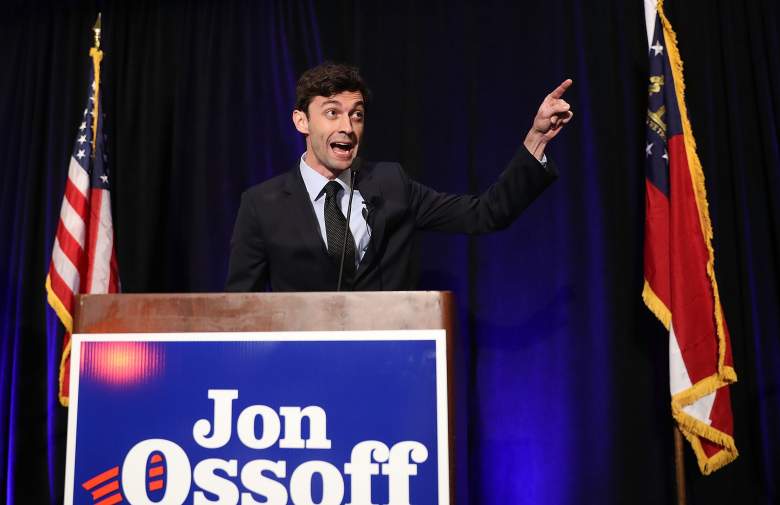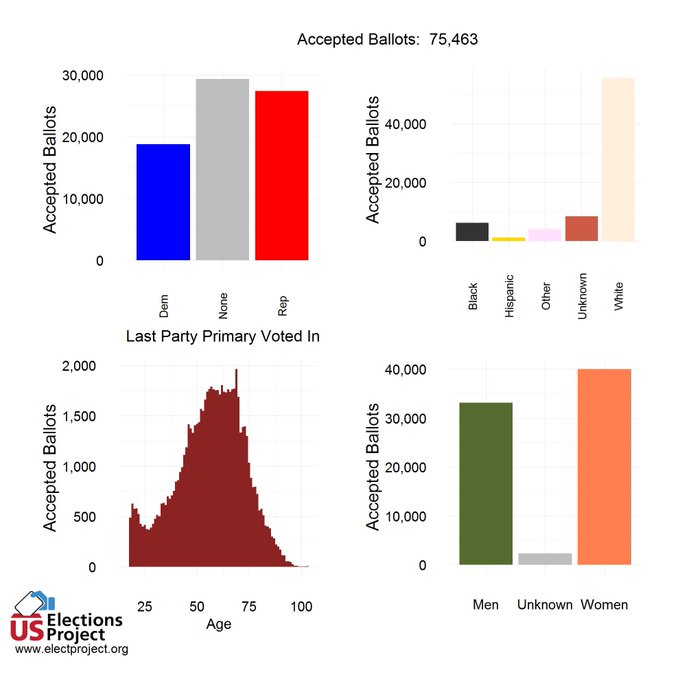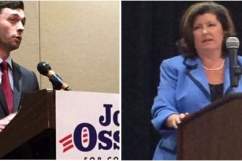
Jon Ossoff (Getty)
A new poll released by the Atlanta Journal-Constitution on Friday shows that with just under two weeks until the Election Day, Democrat Jon Ossoff has a large lead on Republican Karen Handel to represent Georgia’s 6th Congressional District.
The poll, conducted by Abt Associates from June 5-8, showed Ossoff with 51 percent to Handel’s 44 percent prior to the June 20 runoff. Almost 5 percent of voters said they remained undecided in the election.
The survey used a large sample size of 1,000 likely voters in the district, and had a margin of error of 4 percentage points.
Full results weren’t immediately released by the AJC, but they selected a few notable crosstabs.
Other findings of the poll show that Ossoff, a first-time politician, has a huge lead against Handel among women. He leads 60 percent to 34 percent for the group, but Handel leads Ossoff in male voters 52-41 percent.
Another notable finding is that Ossoff had 13 percent support of those voters that identify as Republicans, and another 50 percent of independent voters.
The AJC poll comes just one day after the results of a WSB-TT Channel 2 poll found Ossoff with a narrow 49.6-47.1 lead on Handel. That poll, however, surveyed just 420 likely voters — far less than the newest findings.
A poll that was released in late May by SurveyUSA showed similar results to the new AJC poll. It found that Ossoff held a 51-44 percent lead on Handel with a margin of error of 4.3 percentage points. That survey had 700 participants.
Any way you put it, though, the recent polling is positive news for the Ossoff campaign in the race to replace which is being held to replace former Rep. Tom Price in the U.S. House of Representatives. He was confirmed as the secretary of the Department of Health and Human Services.
Early Voting Approaching Historical Margins
As of June 8, early voting data showed that voters in the district have came out in historic numbers.
The early voting period in the congressional runoff race started May 30 and runs through June 16.
There have already been over 75,000 ballots cast since the early voting period started. With 75,463 people already voting, there’s a strong belief that it could top an unprecedented 100,000 early votes before the deadline.
That’s an incredible number in itself, and is significantly ahead of the amount of people who cast ballots early for the April 18 special election. About 55,000 people did so then, and Ossoff won the first round of voting handily.
Ossoff tallied 48.1 percent of votes in the April 18 election while Handel was second with 19.78 percent. But because no candidate got 50 percent of the vote, the top-two vote getters — Ossoff and Handel — headed to a much-anticipated runoff.
The United States Elections Project’s Michael McDonald has been charting the early voting data from the district. His most recent graph shows that a majority of early voters don’t identify with a political party, barely edging the amount of Republicans that have already voted.
New York Times political analyst Nate Cohn took a look at the data as well, and found that the early voting turnout, while extremely high, has started to taper off. It remains unclear exactly as to which candidate the large number bodes well for.
When early voting started, it was on pace to outnumber the 2016 general election. But, as expected, that’s slowed down recently with a majority of regular voters having already voted.
Another Debate Down
Ossoff tallied 48.1 percent of votes in the April 18 election while Handel was second with 19.78 percent. But because no candidate got 50 percent of the vote, the top-two vote getters — Ossoff and Handel — would face off in a much-anticipated runoff.
The two squared off in a heated debate on June 6, the first — and likely only — televised debate of the campaign before Election Day.
They met again in a second debate June 8, and both candidates took their gloves off a little more than the first time. It was quite the change from the first debate, where the two seemed a lot more polite.
The New York Times reported that Ossoff and Handel attacked each other on personal things and a slew of topics in the un-televised debate. It happened to take place after former FBI Director James Comey testified in front of Senate, so some questioning predictably revolved around that issue.
Handel said that she calls for an independent investigation into President Donald Trump‘s presidential campaign, but said that she wasn’t an “extension of the White House.” She also notably failed to offer unwavering support for Trump and his administration.
Ossoff, on the other hand, tried to take a step back from being labeled a hardcore Democrat. Instead, he said that he wouldn’t vote to raise taxes — not even on the wealthy.
“I don’t support any increase in income tax rates,” The Times wrote as to how Ossoff answered a question. He added that he didn’t support a single-payer health care system.
Click here for a full analysis of the second debate.
Ossoff Reports Eye-Popping Fundraising Figures
On June 8, the Ossoff campaign reported an incredible congressional fundraising haul of over $15 million raised in the past two months. That easily breaks the record for the quarter reporting he set earlier this year when his campaign said it had collected over $8.3 million for the congressional race.
That’s a total of $23.6 million raised since his campaign started, an extraordinary number. Though it’s not clear how much of the funds had come from within the district and how much came from outside groups. The Handel campaign had yet to report its fundraising figures.
The race is already the most expensive race in House election history, and it’s gained national exposure throughout the past few months.
So much so, that Vice President Mike Pence is in Georgia on June 9 campaigning with Handel.
A Democrat hasn’t served the 6th district in the House since John Flynt Jr. was elected in 1965. But the promising numbers for Ossoff has shown that Democrats have a real shot at winning.
According to PredictIt.com, Ossoff has about a 60 percent chance to win the race.



